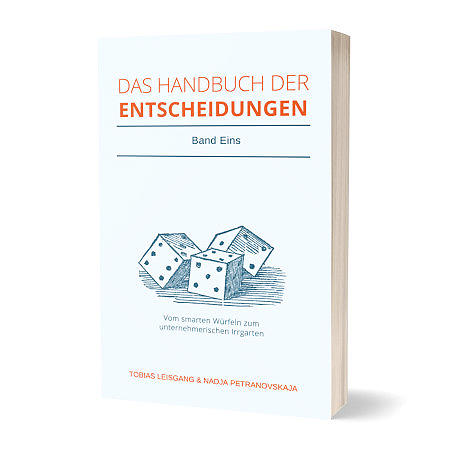And he does play dice…
On a rainy winter evening in 1926, Albert Einstein writes a letter to his physicist friend Max Born. The lines
“Theory delivers a lot, but it hardly brings us any closer to the secret of the old man. In any case, I am convinced that he does not play dice.”
later turned into the famous sentence “God does not play dice”.
Because of his resemblance to the chief detective from the German crime series of the same name, Karl Maier is called “Der Alte” (The literal translation is: The old man. The show itself was translated as “The Old Fox”.) Karl is the managing director of CoolGrill. The medium-sized automotive supplier builds radiators for cars. Karl Maier does not play dice either. Because when it comes to decisions, only numbers, data and hard facts count for the company manager. However, decisions have become increasingly difficult for him lately. Call-off figures fluctuate more than ever during the crisis. When it came to forecasting how many battery-powered vehicles are to be expected in the next few years, he found different statements. And when it came to the question of which technology the next generation of one of his products would be based on, his development manager found it difficult to name probabilities of success for the different options.
Let chance decide
Heads or tails?
Recently, Karl Maier was a spectator at his grandchildren’s handball match. At the beginning of the game, the referee decided by coin which team could choose the side. In the first half, Karl was not quite on track. On Friday, an agency presented him with two options for the re-design of the company website. He had a hard time deciding. Then, during the half-time break, it became too much for him. He dug a coin out of his pocket and flipped it in the air. Heads for the serious design that simply transfers the previous colours and graphics into a contemporary layout and technology. Tails for the bold design with the fresh colour palette and new logo. When the coin lands on his hand again, the federal eagle beams at him. Disappointment spread and Karl heard his gut feeling aloud “Dare. Go for the bold design!”.
“Cointossfeel” is what we have christened this phenomenon. The coin toss acts like an amplifier for your inner voice. By the way, if your inner voice doesn’t speak up during the coin toss, it doesn’t matter. You have nevertheless come to a quick decision. But what do you do if you don’t have a coin at hand? Karl was recently at the snack stand during his lunch break. Bratwurst or fish sandwich? The number plate of the next passing car decided. An odd number got him a delicious fish roll.
Alea iacta est
In the meantime, Karl Maier has acquired a taste for letting chance decide from time to time. When deciding which product idea to implement next, however, there are 10 promising candidates. These 10 candidates are presented to the management in one afternoon. The project teams present business cases and numerous other reasons why their idea will help the company. However, few of the presentations are hard facts, but many are forecasts about the future. Karl Maier and his board team ask for a few days to think things over.
During an evening game of Monopoly with the grandchildren, Karl wins the Park Lane with a double 4. If deciding with a coin works so well, why not try the dice? After the grandchildren have gone to bed, he grabs the two dice again. The next day, product idea #9 wins the bid. Only later does he notice that not all product ideas had the same chance. Because with two dice, some numbers occur more often than others. Next time Karl will simply use poker cards and choose the number of cards equal to the number of options.
Who joins the team – personnel selection by drawing lots
When it comes to personnel decisions, however, Karl Maier leaves nothing to chance. When the position of sales manager was vacant recently, suitable candidates were examined for their suitability in interviews. In a weighted decision matrix, requirements such as negotiating skills, clear communication and business acumen were evaluated. It was a neck-and-neck race between the experienced Key Account Manager from the company and the young, dynamic external candidate. In the end, Karl Maier chose the applicant from his own ranks.
Here, too, chance could have ensured a good decision. Margit Osterloh, an economist at the University of Zurich, propagates determining managerial positions by lot. In a focal random decision, a suitable group of candidates is first determined on the basis of required competencies. From this group of candidates, the right person is then chosen by lot. The positive effect of this procedure was confirmed by experiments at the University of Zurich.
What is the point?
Preventing thinking errors
According to Professor Osterloh, the focal random decision eliminates the gender gap. Karl Maier’s decision in favour of the internal candidate as the new sales manager may have been affected by a thinking error. Among other things, the gender bias ensures stereotypical role assignments. If Karl Maier attributes more negotiating skills to the male gender, this may have unconsciously tipped the scales in favour of the internal candidate.
Thinking errors may also be at work when deciding on the next product idea. The status quo bias ensures that options are preferred that provide the least change. As a result, Karl Maier may opt for product ideas that are closer to the existing product portfolio. However, it may be the worst choice for sales growth.
Dealing with uncertainty
There are often situations where knowledge is not yet available or robust data is not yet available. In the case of the new website, Karl Maier has no facts about how many of the visitors will be attracted by a traditional presence. Of course, he could do a survey among his existing customers to find out which option they tend to prefer. However, this does not give him any figures on how many new customers can be generated by the modern appearance. Moreover, it causes additional costs, because the data have to be obtained first.
Even when deciding on a product idea, there are still no reliable facts. All business cases are forecasts. Some business cases may be more reliable because they have information from existing customers and do not have to look so far into the future. Usually, further data is now requested for the decision. Queries are made to existing customers, market studies are further detailed and risks of implementation are assessed. Besides the costs for obtaining further data, however, there are also indirect costs. Here I always have to think of the commercial for a dishwashing detergent. While Villabajo was still scrubbing, Villariba was already partying again. And while you are still collecting facts and figures, your competitor is already on the market with a new product. That can cost you a lot of sales.
Decide quickly
So chance also helps to decide quickly. I don’t know whether dice are also used at Amazon. However, quick decisions are propagated there, as one learns from a letter to investors. Basically, a distinction is made between two types of decisions. Type 1 decisions have significant consequences and cannot be reversed or can only be reversed with great difficulty. Most decisions, however, are type 2 decisions. These are meant to be made quickly because they can be easily reversed. Type 2 decisions can be thought of as revolving doors, while type 1 decisions are doors with only one knob.
So why is the decision not made by chance?
The illusion of rational decision-making
A cognitive bias is also responsible for this, namely the blind spot bias. People believe that they are free of cognitive distortions and could decide completely objectively. But unfortunately, decisions are rarely completely rational. Even when sufficient data and facts are available, they usually still have to be interpreted and weighted. So the cognitive distortions and thinking errors still have enough play.
Giving up control and power
However, using chance as a decision-making aid also means relinquishing control. For neither the dice nor the lottery know the principle of “one hand washes the other”. This is also confirmed by Professor Osterloh when she is asked why the focal random decision is not used more: “The random procedure reduces the power of those who decide so far, that’s why they resist the focal random decision.”
You can’t make a multi-million dollar decision by dice
Even if the advantages of a random decision are obvious, who would publicly admit to making a million-dollar decision by chance? Yet you don’t have to go all-in at all. The principle of affordable loss from effectuation can help here. If you limit the size of the decision to an amount that you could bear if it failed, a random decision is easily bearable.
Let’s look at an example from CoolGrill. CoolGrill wanted to expand its Eastern European business and open a sales office in Romania. Office building, personnel costs and operation mean an investment sum of one million euros for the next 12 months. Karl Maier did not want to roll the dice on such a decision, because it exceeds his affordable loss by a factor of 50. Instead of obtaining figures, data and facts about different locations and employees, he had a list of freelance sales staff in different cities drawn up and chose one of them by lot.
Should chance come to the rescue for all decisions?
Should all decisions in the company now be determined by coin and dice? Type 1 decisions have significant consequences and are difficult to reverse. So they want to be well thought out and I would not entrust the decision to a dice. Type2 decisions, where sufficient knowledge is available, can of course also be made by individual or group decision. In addition, a participatory decision-making process can ensure that those affected have greater ownership and support for the decision. However, the advantages of random decision-making should not be underestimated. So dare to let the coin, the dice and the lot decide more often. Even the old man is using it more and more often. So he does play dice…
Notes:
If you like the article or want to discuss it, feel free to share it with your network.
You can find more on the topic of decisions, smart dice rolling and entrepreneurial mazes in the German Handbuch der Entscheidungen by Nadja Petranovskaja and Tobias Leisgang.
Tobias Leisgang has published more posts at the t2informatik Blog:

Tobias Leisgang
‘The future is the only place I’ll spend the rest of my life’ – Charles Kettering was right and Tobias Leisgang takes this quote very seriously. After studying electrical engineering, he developed semiconductors, researched the latest technologies with global teams and made the supply chain of an automotive supplier fit for the future.
Today, he helps small and medium-sized companies develop sustainable business models – with a great deal of foresight and a dash of pragmatism. Because there are often many decisions to be made between good ideas and their implementation – and that’s exactly where Tobias comes in: in ‘Kopf & Bauch – Der Podcast der Entscheidungen’, he provides exciting insights into how to make them.
And because standing still is not an option for him, Tobias continues his journey as a future shaper – not in a fancy suit, of course, but as a student in the future design programme. After all, who says you can never learn enough?



